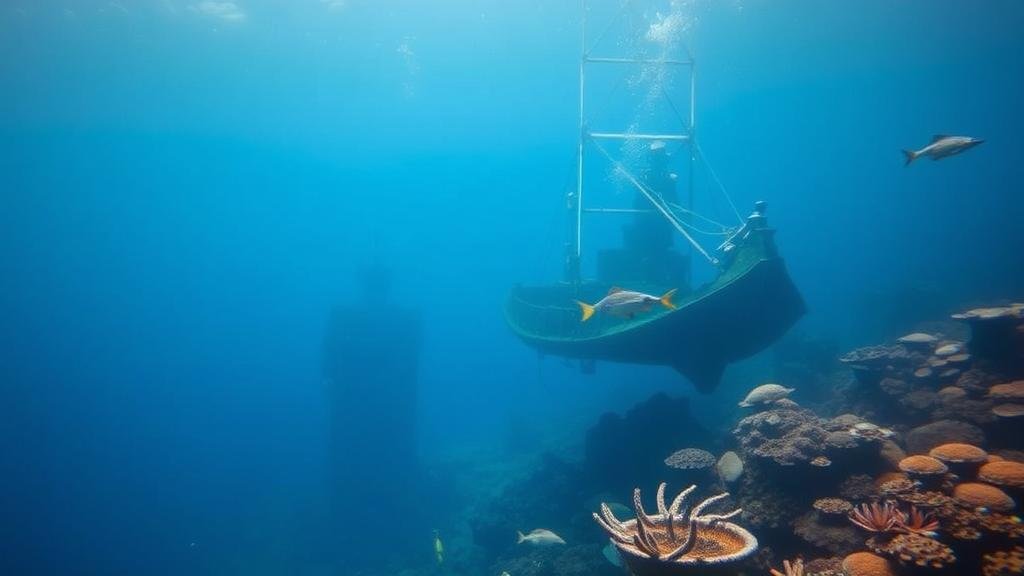Searching for ancient sunken treasure fleets in tropical coral reefs.
Searching for Ancient Sunken Treasure Fleets in Tropical Coral Reefs
The allure of sunken treasure has captivated adventurers and historians alike for centuries. In the tropical waters of the Caribbean, the remnants of ancient fleets lie hidden beneath vibrant coral reefs, offering a glimpse into the maritime glory and the tragic tales of wrecks dated back as far as the 16th century. This article explores the fascinating world of treasure hunting in these biodiverse ecosystems, illuminating the historical context, the methodologies employed in recovery efforts, and the importance of conservation.
A Historical Overview of Treasure Fleets
The golden age of piracy and Spanish treasure fleets dominated the 16th to the 17th centuries, especially in the waters surrounding the Caribbean Islands. Notably, the Spanish East India Company operated numerous fleets that transported gold, silver, and precious gems from the New World to Spain. One of the most infamous examples is the wreck of the Nuestra Señora de Atocha, which sank in 1622 near the Florida Keys. This vessel was laden with an estimated $400 million in treasure, which remained undiscovered until salvaged in 1985 by treasure hunter Mel Fisher.
Also to the Atocha, numerous other vessels met similar fates. For example, the Santa Margarita, which sank in a storm near the Dry Tortugas in 1622, still captivates treasure hunters today as it is said to carry gold coins, jewelry, and spices. Such incidents of naval disaster left countless treasures scattered across the ocean floor, often accompanied by tomb-like silence of coral reefs that have now claimed these historic artifacts.
The Ecological Importance of Coral Reefs
Tropical coral reefs are not only the resting places for these sunken treasures but are also vital ecosystems that support a vast array of marine life. Covering approximately 0.1% of the ocean floor, coral reefs are home to 25% of all marine species. serve as breeding grounds, sanctuary habitats, and provide essential resources for coastal communities.
But, coral reefs are increasingly under threat from climate change, pollution, and overfishing. According to the World Resources Institute, around 50% of the worlds coral reefs have already died due to human activities, providing an urgent call to action for both treasure hunters and marine conservationists. This intertwining of history and ecology makes the search for ancient treasures a delicate balance between exploration and conservation.
Methodologies in Treasure Recovery
The advent of technology has significantly advanced treasure recovery operations in coral ecosystems. Modern techniques employed by treasure hunters include:
- Sonar Mapping: High-resolution sonar imaging helps locate submerged shipwrecks by providing detailed seabed maps, allowing explorers to identify areas of interest accurately.
- Diving Technology: Scuba diving and advanced submersible technology allow treasure hunters to physically explore wreck sites while minimizing disturbance to the marine environment.
- Magnetometry: This technique detects metal objects on the sea floor, assisting in locating the remains of shipwrecks and their cargo.
For example, in the search for the wreck of the Spanish Galleon San Juan, explorers utilized magnetometers to pinpoint hull remnants, which led to significant discoveries of artifacts, while ensuring minimal disruption to the surrounding coral reef habitat. Plus, underwater robots and drones increasingly employed to collect data without the need for human divers, enhancing both efficiency and safety during operations.
Challenges and Ethical Considerations
While the promise of riches might lure treasure hunters, ethical considerations loom large over the recovery of artifacts from these delicate ecosystems. The legality of treasure hunting varies substantially by country, with regulations often emphasizing the protection of cultural heritage and marine environments.
Also, the potential for looting unprotected sites raises concerns about heritage loss and environmental degradation. As seen in the case of the Nuestra Señora de Atocha, which prompted debates concerning ownership and historical accountability, the quest for treasure should ideally adhere to guidelines that prioritize preservation over profit.
Real-World Applications and Future Perspectives
The quest for sunken treasure can yield far more than material wealth; it often leads to significant archaeological and historical findings that add invaluable chapters to the stories of maritime history. Collaboration between treasure hunters and marine archaeologists can facilitate ethical recovery practices while ensuring that historical narratives are preserved for future generations.
For example, initiatives such as the Project to Recover the Lost Galleons of the 18th-century Spanish Fleet focus not on the treasure alone but on the historical context and environmental factors that surround these wrecks, culminating in educational outreach programs aimed at raising public awareness about marine conservation.
Actionable Takeaways
For those drawn to the thrill of treasure hunting in tropical coral reefs, consider the following points:
- Prioritize ethical artifacts recovery and comply with all regional laws and regulations.
- Engage with marine conservation efforts to protect coral reefs during and after treasure recovery.
- Embrace technology to enhance efficacy and reduce environmental impact.
- Collaborate with experts in marine archaeology for responsible exploration and documentation of findings.
To wrap up, while the pursuit of ancient sunken treasures in tropical coral reefs can offer exciting prospects, coupling exploration with ecological responsibility enhances the adventure while safeguarding the treasures of our oceans for future generations.



